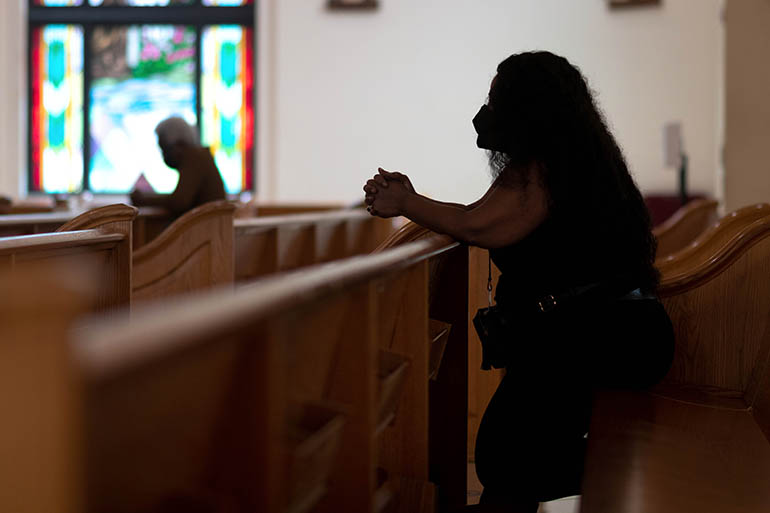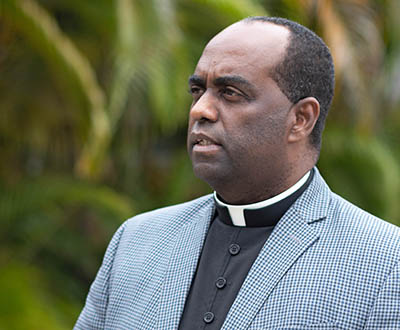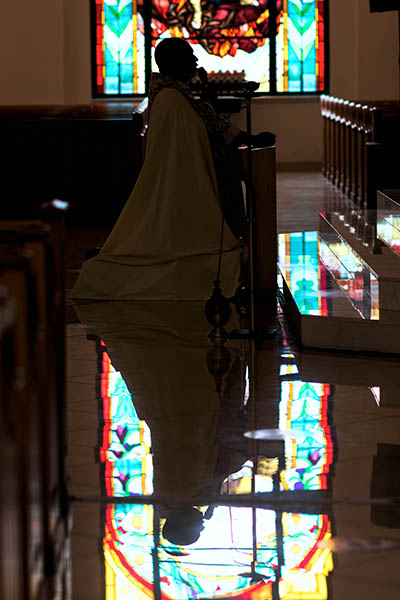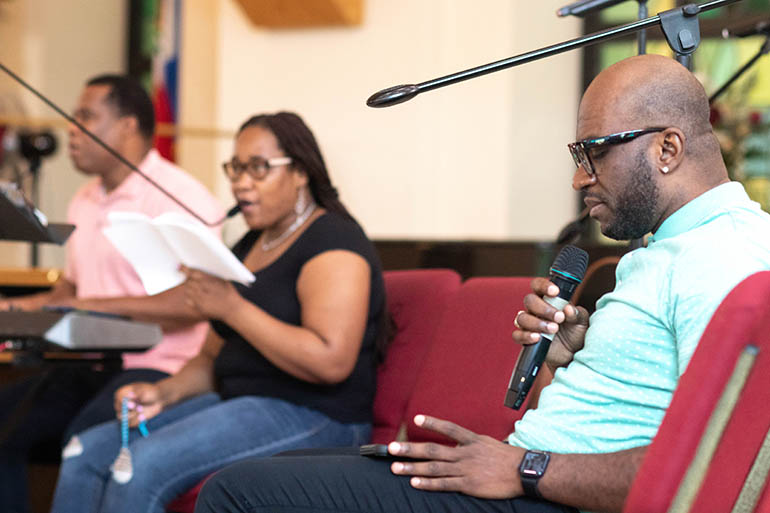By Tom Tracy - Florida Catholic

Photographer: TOM TRACY | FC
A woman prays at Notre Dame d'Haiti Mission in Miami during a eucharistic adoration and afternoon prayer vigil for Haiti held on July 7, 2021 in light of the assassination earlier in the day of Haiti's embattled President Jovenel Moisé. The community also prayed for Haiti's First Lady, who was injured in the attack and flown to Miami for medical care.

Photographer: TOM TRACY | FC
Father Reginald Jean-Mary, administrator of Notre Dame d'Haiti Mission in Miami, talked to the media before leading a eucharistic adoration and afternoon prayer vigil for Haiti on July 7, 2021 in light of the assassination earlier in the day of Haiti's embattled President Jovenel Moisé.
MIAMI | A sense of quiet and shock in Haiti following the assassination of that country’s embattled president July 7 seemed to be mirrored in Florida’s Little Haiti neighborhood, where residents were still digesting the news later that day.
“There is a sense of calm, but you wonder what kind of calm that is and what is coming, with all those heavily armed gangs and no prime minister and no idea who is replacing the country’s leadership,” said Father Reginald Jean-Mary, administrator of Notre Dame d'Haiti Mission in Miami. He spoke with the Florida Catholic July 7 before leading an hour of prayer for Haiti following the death of President Jovenel Moise.
A small group of heavily armed mercenaries descended on the president’s house in the early morning hours of July 7, killing him and critically injuring his wife, who was subsequently flown to Miami for medical treatment. A day later, several suspects were reportedly shot or apprehended.
Archbishop Thomas Wenski, who was away from Miami on a silent retreat, wrote in a “mini op-ed” he contributes regularly to the Fort Lauderdale Sun-Sentinel, that the assassination could easily result in Haiti becoming “the Somalia of the Caribbean. That four of the six assassins have themselves been killed by police further raises suspicions,” he wrote, citing a Haitian proverb that says, “voye woch kache men”: the rock thrower hides his hand.
“If chaos is to be avoided and Haitians have a chance at a future of hope, those hidden hands have to be exposed,” the archbishop wrote.
Father Jean-Mary, who leads a 5,000-person community of Haitian Catholics near midtown Miami, said he had been talking with members of his church and with community leaders after the news broke.
“People are in a state of disbelief and a state of shock that a son of the country got murdered — a leader, a human being, a father. This is not a time for rejoicing. It hurts everybody whether you liked him or not,” he told the Florida Catholic.
His church hosted the hour of eucharistic adoration — as they have been doing every day during the COVID-19 pandemic — “to call upon the mercy of God for Haiti and for everybody to demonstrate a spirit of mercy and forgiveness so that we can live in that spirit of conversion that the Lord has called us to,” the priest said.
Father Jean-Mary believes the presidential assassination marks a new low for Haiti, which has been enduring an era of profound chaos and lawlessness for more than a year, with roving street gangs carrying out killings and kidnappings with impunity. President Moise, by virtue of his role, was a focus of frustration, seen as doing little and saying little about the internal disorder, according to the priest.

Photographer: TOM TRACY | FC
Father Reginald Jean-Mary, administrator of Notre Dame d'Haiti Mission in Miami, leads a eucharistic adoration and afternoon prayer vigil for Haiti on July 7, 2021 in light of the assassination earlier in the day of Haiti's embattled President Jovenel Moisé. The community also prayed for Haiti's First Lady, who was injured in the attack and flown to Miami for medical care.
“Haiti has never been in this position before. We really went down very low, where values are not respected at all, where fundamental values are being violated every day and no sense of order. It is like everybody can do whatever they want, corruption levels are very high.”
The priest said he hoped the international community would lend a hand to help Haiti regain its footing and establish law and order.
“I would not be talking about forces but we need a presence who can restore calm in the country along with the Haitian police and along with the Haitian officials to make sure everything goes well. In the past, (military) occupations didn’t serve any good for us.”
Notre Dame d'Haiti Mission’s longtime member and church event coordinator Jean Souffrant, who attended the July 7 eucharistic adoration, said he was appalled at yesterday’s developments. He last visited Haiti in March to attend the funeral of a family friend but noted he was traveling to his birthplace less and less recently due to the lack of safety there.
“Like everybody else, I woke up today with the shocking news of the assassination and I thought it was very senseless and brutal — no one deserves to die in that manner,” he said.
Relatively few people turned out for the prayer vigil July 7 as it took place during the middle of the work week. Still, Souffrant said, people in Miami are very connected to developments in Haiti.
“It doesn’t matter what was happening in the country — if we wanted him to leave, then we wanted him to leave, but for him to die the way he died was very inhumane. This was a human being and to see the way he died was very cruel,” Souffrant said. “To see so much blood being spilled it just is absolutely not what we as a people want to see of our country. We want to see educated folks, we want to see happy children, nourished children and happy people — but for the past year that has not been the case.”
Fiammetta Cappellini, Haiti-based country representative for the Milan-based AVSI, which earlier this year maintained some 15 international staff and 300 local staff working in both rural, urban and slum programs across Haiti, told the Florida Catholic that the country has come to a stop following the assassination, with traffic halted and international borders closed.
“As a humanitarian NGO, we are very concerned about the population, especially those who live in the most vulnerable neighborhoods and areas,” Cappellini said by email. “In these areas, a large part of the population depends on humanitarian aid which is now suspended and we do not know when the organizations will be able to continue their operations because we must be able to guarantee the safety of our staff before resuming activities.”

Photographer: TOM TRACY | FC
Members of the choir pray at Notre Dame d'Haiti Mission in Miami during a eucharistic adoration and afternoon prayer vigil for Haiti held on July 7 in light of a reported assassination earlier in the day of Haiti's embattled President Jovenel Moisé. The community also prayed for Haiti's First Lady, who was injured in the attack and flown to Miami for medical care.

